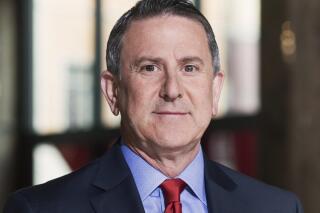Target CEO addresses omicron, wages and shopper habits

Target CEO Brian Cornell is photographed at Target Plaza Commons in Minneapolis on Feb. 21 2017. Target is heading into the final stretch of the holiday season with lots of momentum. Cornell reports that holiday sales have continued to stay strong even amid worries about the new omicron variant. (Target via AP)
NEW YORK (AP) — Target is heading into the final stretch of the holiday season with lots of momentum.
CEO Brian Cornell reports that holiday sales have continued to stay strong even amid worries about the new omicron variant. Like its big box rivals, Target has been able to defy industrywide challenges like labor shortages, inflation and supply chain snarls as the discounter keeps its shelves full and arms itself with a full seasonal staff of 100,000.
Under Cornell’s stewardship, Target had been accelerating its online services such as curbside pickup and same-day services while sprucing up its stores well before the pandemic. The company raised its minimum wage to $15 per hour in 2020, a commitment it pledged in 2017 and well ahead of many grocery rivals.
Still, Cornell predicts that supply chain issues will be around for several years, and he is monitoring to see how inflation will affect shopping habits at Target.
The Associated Press recently interviewed Cornell, 62, on a wide variety of topics from omicron to inflation and wages as well Target’s decision to no longer open its stores on Thanksgiving. His responses have been edited for clarity and length.
Q. How worried are you about omicron?
A. We’re going to continue to make sure we work with the experts. We’ve had a dedicated team in place, a coronavirus task force team that we set up all the way back in January of 2020. And they’re going to continue to guide us through the steps that we have to take to make sure we’re focused on the safety of our team and the safety of our guests.
Q. Have you seen any changes in shopping behavior because of omicron?
A. I’m seeing guest shopping at our stores, shopping all of our categories. So I haven’t seen any changes in the shopping patterns that we were expecting. But as you’ve seen us throughout the pandemic, we know we’ve got to flex based on the guests’ needs so that if they suddenly decide to shift from using stores or going back to the same day services, we’re ready for them.
Q. Which habits will stick when the pandemic is over?
A. I expect stores will continue to be really important going forward. And obviously, Americans have learned how to use their smartphones and tablets to shop online. And I think we’re seeing all cohorts embracing both shopping in-store and using our same day services, and I think same-day services are going to be sticky for years to come.
Q. What do you think is driving the dissatisfaction among retail workers?
A. I really can’t speak for what’s happening in other industries and other companies. But I know our teams want a chance to have a rewarding career at a place where they want to work and it shows up in our engagement and retention numbers each and every week.
Q. How are you thinking about wages?
A. We did provide an extra $2 for our teams on (holiday) weekends. And while $15 is the mark we’ve set city by city, town by town, we evaluate what our wage should be to ensure that we are competitive, we’re attracting and retaining talent.
Q. Do you think Target will lose workers over the federal vaccine mandate?
A. It’s really hard to tell at this point. And again, we want to make sure that we’ve provided an opportunity for our team members to have the options that are being prescribed. So whether it’s vaccination or testing, we want to make sure we offer them those options and hopefully they continue to find Target a great place to work.
Q. What percentage of Target workers are vaccinated?
A. We’re pulling together that information. I don’t have it yet, but we certainly will be in a position as we go into the first part of the year to understand exactly what percent have been vaccinated and what team members will be required to have weekly testing.
Q. Has inflation changed shopping habits at Target?
A. I think it’s still just too early. We’re going to learn a lot more about how the consumer reacts to inflationary pricing over the next six months. And do they choose an alternative brand? Do they decide to purchase one of our own brands? So, we’ll watch that very carefully.
Q. When do you think the supply chain issues will ease?
A. I think this is going to be something that’s going to take place over a number of years as we make the investments and really take our supply chain capabilities across the United States to another level. We have the inventory in the system in place to meet their needs. But it’s the supply chain pressures that are not going to go away on January 1st. It’s really driven by just incredibly strong demand and a very healthy U.S. consumer.
Q. Target announced that it will permanently close it stores on Thanksgiving. Why haven’t other major retailers followed your lead?
A. I’m not sure what they’re going to do, but we stepped back and said, ‘What’s the right thing for our team? What’s the right thing for our guests?’ And it was really clear to me how important it was to allow our team members to enjoy Thanksgiving with their friends and family.
————
Follow Anne D’Innocenzio: http://twitter.com/ADInnocenzio


